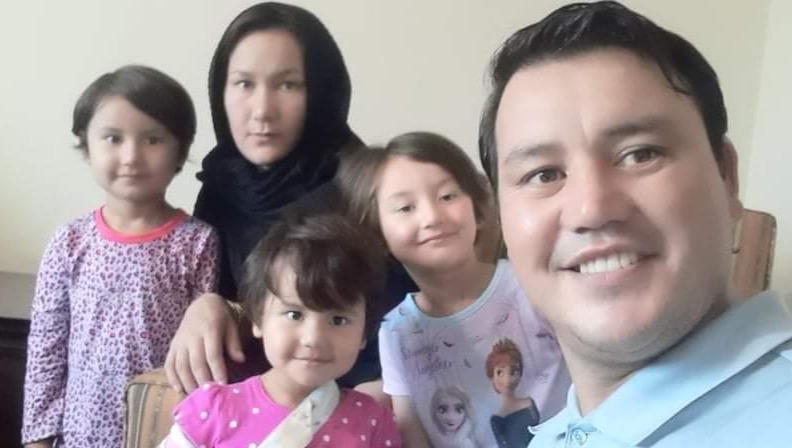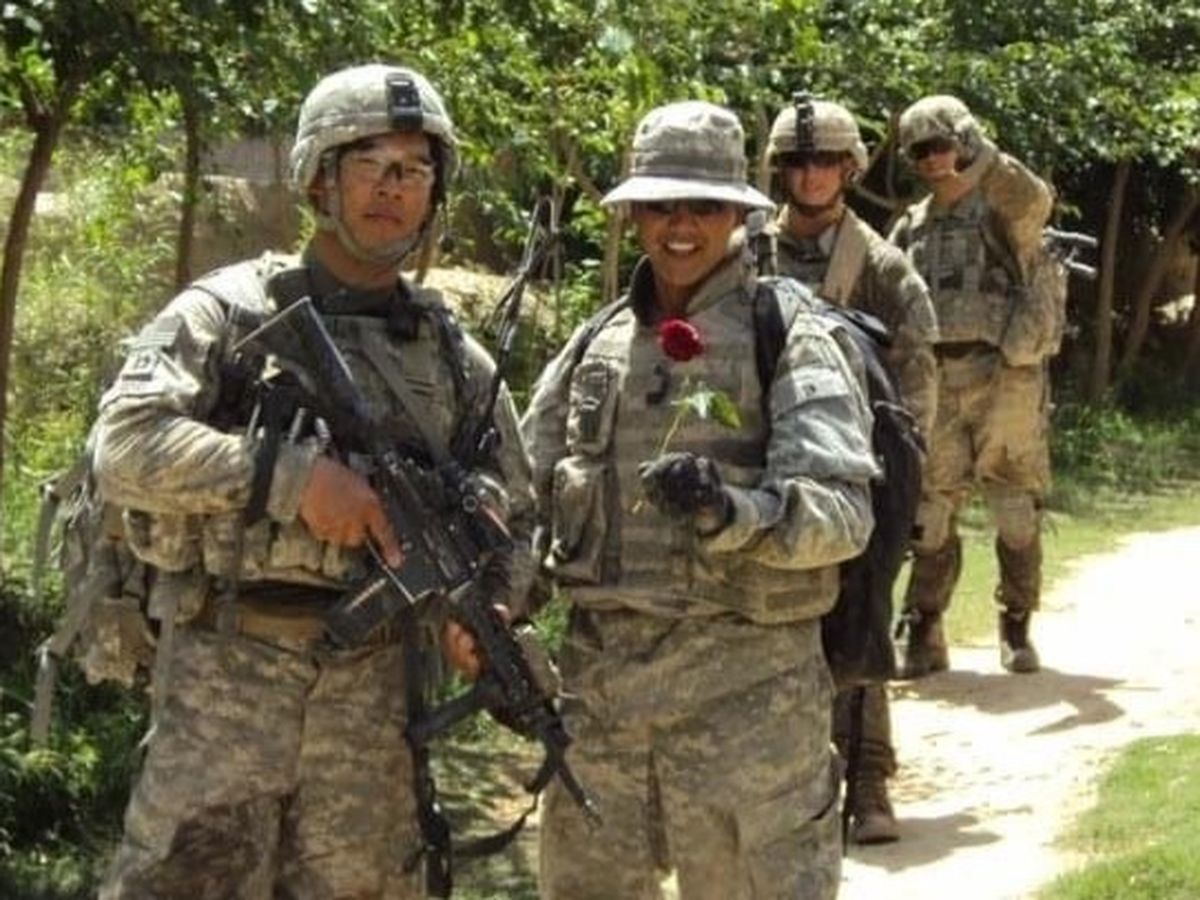
This is Zabihullah "Johnny" Rassoly. Formerly an Afghan interpreter, he was forced to flee his home when the Taliban surged across Afghanistan. Among the tens of thousands of Afghans that worked with Americans, risking his life along with us, he, his wife, and his three girls were among the fortunate few that were able to make it to America – a distant promise we were able to keep.
Leaving everything and everyone he once knew behind, we asked him, “where do you want to live?” To which he could only reply, “where do you live, sir?”
As a Hazara minority in Afghanistan, Johnny has only known persecution and conflict with brief moments of peace and safety. The Hazaras continue to be one of the most persecuted minorities in the world, suffering from pogroms and genocide at the hands of the Taliban. Help this family find peace and help Johnny’s daughters grow and thrive where they may finally live without fear of cruelty.
Johnny, we’re proud to welcome you to America.

For those that want to read more about Johnny’s harrowing path to the United States, please continue reading.
It was Johnny’s first job as an interpreter for U.S. forces. Having just graduated high school and with no formal training, Johnny drew the very short straw of being assigned to us, Bravo Company, 2-508 Parachute Infantry Regiment of the storied 82nd Airborne Division in the Arghandab River Valley.
By the time Johnny arrived, the Arghandab had already tasted its fair share of blood. The battalion that formerly occupied it had to transfer authority to us ahead of schedule after sustaining too many casualties. A previously unoccupied area, it had become a Taliban staging area and under different conditions, could have been a lush, almost picturesque rural setting dotted with small hamlets. Instead, those hamlets were left abandoned, forcefully occupied by the Taliban to stage ambushes and make the improvised explosive devices (IEDs) that saturated the ground we walked.
It was in this environment, Johnny lived, walked, and fought with us. We had to send a strong message to our enemy: we would saturate the battle-space more fiercely and aggressively than they could even imagine. We would have multiple patrols out at a time, sometimes packing enough supplies to stay out for several days at a time - to keep the enemy backpedaling.
After our platoon’s last interpreter decided he’d had enough of the danger, it was Johnny’s turn. It wasn’t easy at first. The platoon leader sometimes had to use his rudimentary Rosetta Stone Pashto when Johnny couldn’t understand what was being said. But this did not last long. When we were on patrol, Johnny was on patrol. When we kicked back and joked with each other, Johnny laughed with us. When we were angry or sad after a casualty, Johnny mourned with us. And when it came time to assert ourselves with the enemy, Johnny followed passionately, fluently echoing any command.
It was a hard year, and many of those that made it through wouldn’t see or hear about the fruits of our toils until years later. Others would succumb to their mental wounds. Slowly, our little sector filled with farmers again. Gradually, more children would come up to us asking for pencils or candy. Previously overgrown fields bore fruits and crops again. Afghan people would walk the same grounds as us again.
The fighting and IEDs never fully stopped however. After a year fighting for our small sector, leaving the Arghandab was bittersweet. The tension and alertness could finally fade and we could return home, yet we had to hand over everything we fought and sacrificed to achieve to people we never met. The bonds forged with Johnny, Afghan Army soldiers, and local villagers tugged at the prospect of returning home. When we said goodbye to Johnny, we told him we would see him again in the United States.
Fast forward to 2021, and we had no idea how our prediction would come true.
When Herat fell, we found Johnny through the Internet. He had since grown older, married, with three young daughters.
“Johnny, are you ok?”
“I am ok, sir. The Taliban took my hometown, so I had to run away to Kabul. It is not safe here.”
“Let’s get you out of there, brother.”
So we committed our evenings to finding networks and information on how to get Johnny out. Non-profit organizations such as The Independence Fund and Mighty Oaks proved indispensable in getting information and getting him safely home. The former platoon leader leveraged his West Point networks to also get an accurate albeit heartbreaking picture of what was happening on the ground.
Johnny and his family meanwhile had nothing except the information we could get them. As the Taliban approached the outskirts of Kabul, we told him he had to make a run for the airport (Hamid Karzai International Airport, morbidly shortened to HKIA) and somehow make it to the flight-line, but many others had the same idea. Taliban and former Afghan National Security Forces (ANSF) that had turned blocked throngs of escapees from entering, beating many of them harshly. Johnny couldn’t get through. Back into hiding.
“Just hold out, Johnny. Stay safe until we can find an opening to get you in. Do you have SIV [Special Immigrant Visa] paperwork?”
“Yes sir, I do.”
“Ok, keep it well-hidden or somewhere on your phone where it would be hard to find. Get ready for us to tell you to go.”
Johnny submitted his SIV paperwork a year prior as an interpreter that had worked with Americans, and it had yet to be processed by the Department of State. This was no exception as many interpreters had to wait five of six years before an SIV packet could be approved. Fortunately, The Independence Fund was able to expedite Johnny’s. Unfortunately, Taliban checkpoints were hunting SIV holders and checking or confiscating phones.
So we found a second opening when supposedly the Taliban guarding the perimeter of HKIA were allowing some people to get through. Johnny was afraid at first, but we told him he just needs to find a way to get to the airfield. We told him to pack food and water as it could be a while.
He waited with his family all day outside in the hot sun until curfew when the Taliban forced people away. Back into hiding again.
Then we found another opening. Third time’s the charm, or so we thought. On this occasion, Taliban guarding the gate tear-gassed people trying to get in. Johnny, with his three small girls, dispersed with the panicked crowds.
Then came a final opening. The Independence Fund’s CEO Sarah Verardo, spouse of a catastrophically wounded veteran who was also in the same platoon as Johnny, was able to make significant political headway to extract Johnny along with several other people trapped in Kabul. Her organization also contracted a plane to support withdrawal efforts, where he was reserved a seat.
“Ok, Johnny, be ready tonight with you bags packed. Someone’s going to come get you.”
And so they did. And Johnny and his family made it to the United States with nothing but the shirts on their backs, trying to find a way to start a new life and make a new home.
We braved the danger together for a year. And most of our paratroopers came back home to safety. Some would return to Afghanistan several more times, but Johnny was there always. It only took one Taliban or Taliban sympathizer to recognize him and find him later. During our time in the Arghandab, it was not unusual for us to have Afghans that collaborated with us then find them later, dead or tortured.
When we met him at a resettlement facility, we often asked him, “Are you feeling all right? Do you need anything?”
Despite having nothing to his name, he replied, “I’m OK, sir. I’m just happy I will be able to raise my children here.”

See below information about this fundraiser and how it will be dispersed.
My name is Jordan Kahn, and I am the wife of one of the veterans that worked with Johnny directly in Afghanistan. I live in Knoxville, Tennessee. Johnny is currently processing through a military base, but should be relocated soon.
We plan to send all of the funds to Zabihullah "Johnny" Rassoly and family as soon as he acquires identification and a bank account, a process that is currently under way. The funds will be allocated directly to Johnny and his family to use for clothing and securing a place to live, as the processing times by the State Department are currently incredibly long.
*This post isn't affiliated or endorsed by the USG or DOD.
*This post isn't affiliated or endorsed by the USG or DOD.

